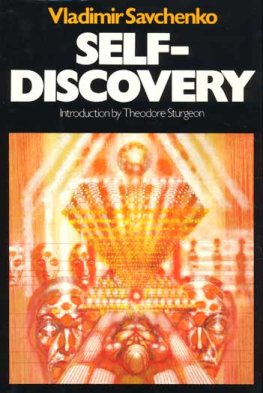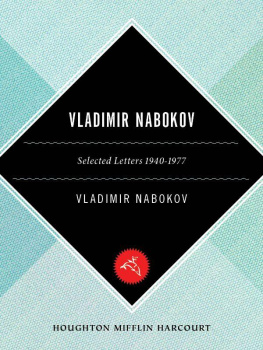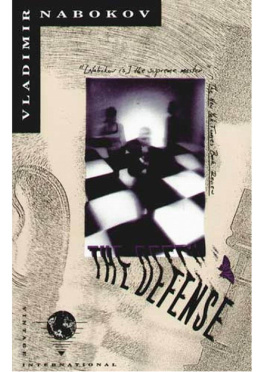Vladimir Bartol - Alamut
Here you can read online Vladimir Bartol - Alamut full text of the book (entire story) in english for free. Download pdf and epub, get meaning, cover and reviews about this ebook. City: Berkeley, year: 2007, publisher: North Atlantic Books, genre: Art. Description of the work, (preface) as well as reviews are available. Best literature library LitArk.com created for fans of good reading and offers a wide selection of genres:
Romance novel
Science fiction
Adventure
Detective
Science
History
Home and family
Prose
Art
Politics
Computer
Non-fiction
Religion
Business
Children
Humor
Choose a favorite category and find really read worthwhile books. Enjoy immersion in the world of imagination, feel the emotions of the characters or learn something new for yourself, make an fascinating discovery.

- Book:Alamut
- Author:
- Publisher:North Atlantic Books
- Genre:
- Year:2007
- City:Berkeley
- Rating:3 / 5
- Favourites:Add to favourites
- Your mark:
- 60
- 1
- 2
- 3
- 4
- 5
Alamut: summary, description and annotation
We offer to read an annotation, description, summary or preface (depends on what the author of the book "Alamut" wrote himself). If you haven't found the necessary information about the book — write in the comments, we will try to find it.
Alamut — read online for free the complete book (whole text) full work
Below is the text of the book, divided by pages. System saving the place of the last page read, allows you to conveniently read the book "Alamut" online for free, without having to search again every time where you left off. Put a bookmark, and you can go to the page where you finished reading at any time.
Font size:
Interval:
Bookmark:
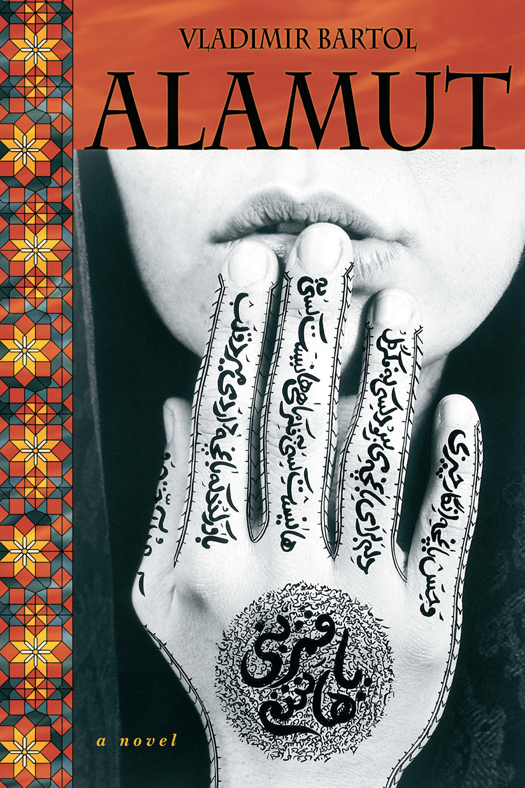
Alamut was originally written in 1938 as an allegory to Mussolinis fascist state. In the 1960s it became a cult favorite throughout Titos Yugoslavia, and in the 1990s, during the war in the Balkans, it was read as an allegory of the regions strife and became a bestseller in Germany, France, and Spain. The book once again took on a new life following the attacks of 9/11/2001 because of its early description of the world of suicide bombers in fanatical sects, selling more than 20,000 copies in a new Slovenian edition.

First published sixty years ago, Alamut is a literary classic by Slovenian writer Vladimir Bartol, a deftly researched and presented historical novel about one of the worlds first political terrorists, eleventh-century Ismaili leader Hasan ibn Sabbah, whose machinations with drugs and carnal pleasures deceived his followers into believing that he would deliver them to a paradise in the afterlife, so that they would destroy themselves in suicide missions for him. Flawlessly translated into English (and also published in eighteen other languages), Alamut portrays even the most Machiavellian individuals as humanruthless or murderous, but also subject to human virtues, vices, and tragedies. An afterword by Michael Biggins offering context on the authors life, the juxtaposition of his writing to the rise of dictatorial conquest that would erupt into World War II, and the medley of reactions to its publication, both in the authors native Slovenia and worldwide, round out this superb masterpiece. An absolute must-have for East European literature shelves, and quite simply a thoroughly compelling novel cover to cover.
Midwest Book Review
For all of its provocative ideas and sometimes eerily prescient incidents, Alamut is also successful simply as an entertaining yarn Bartol devises a shifting collage of passions, adventure, and sacrifice. The books exotic settings are sumptuously described, and the characters are charismatic and complexdespite the fervent aims of some of them to subscribe to single-minded devotion.
Seattle Times
Alamut is a finely wrought, undiscovered minor masterpiece that offers a wealth of meticulously planned and executed detail and broad potential for symbolic, intertextual, and philosophical interpretation.
From the Afterword by Michael Biggins, translator
Whoever wants to understand the success of the Al Qaeda leaders strategy should read Bartol. It is as if Osama bin Laden himself concocted the most powerful fist of his organization only after reading Alamut! The dates line up fatally: The novel was published in Iran in 1995 and was clearly so attractive that it was translated again within four years. In 1996 the suicide attack on the American Embassy in Kenya begins.
Bernard Nezmah, Mladina (Slovenian newsmagazine)
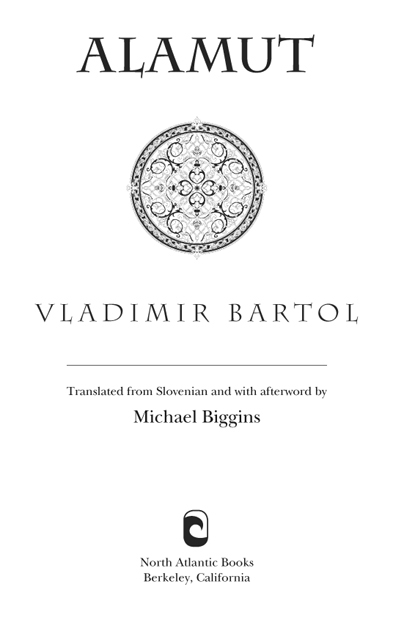
Translation copyright 2007 by Michael Biggins. North American Trade Edition 2007.
English Translation 2011 North Atlantic Books. Afterword 2004 Michael Biggins.
1988 Editions Phbus, Paris.
All rights reserved. No portion of this book, except for brief review, may be reproduced, stored in a retrieval system, or transmitted in any form or by any meanselectronic, mechanical, photocopying, recording, or otherwisewithout the written permission of the publishers. For information contact North Atlantic Books. The translation was made possible in part by a grant from 4Culture, Seattle, Washington.
| Published by | North Atlantic Books |
| P.O. Box 12327 | |
| Berkeley, California 94712 |
Cover image by Shirin Neshat: Untitled. 1996 RC print & ink (photo taken by Larry Barns) 47-7/8 33-3/4 inches 1996 Shirin Neshat, courtesy Gladstone Gallery, New York
Cover design 2007, Ayelet Maida, A/M Studios.
Writing on hand by Forough Farokhzad:
I Feel Sorry for the Garden
No one is thinking about the flowers
No one is thinking about the fish
No one wants to believe
that the garden is dying
that the gardens heart has swollen under the sun
that the garden
is slowly forgetting its green moments
Alamut is sponsored by the Society for the Study of Native Arts and Sciences, a nonprofit educational corporation whose goals are to develop an educational and cross-cultural perspective linking various scientific, social, and artistic fields; to nurture a holistic view of arts, sciences, humanities, and healing; and to publish and distribute literature on the relationship of mind, body, and nature.
North Atlantic Books publications are available through most bookstores. For further information, visit our website at www.northatlanticbooks.com or call 800-733-3000.
Library of Congress Cataloging-in-Publication Data
Bartol, Vladimir, 19031967.
[Alamut. English]
Alamut / Vladimir Bartol; translated by Michael Biggins.
p. cm.
eISBN: 978-1-58394-695-4
1. Hasan ibn al-Sabbah, d. 1124Fiction. I. Biggins, Michael.
PG1918.B33A7813 2007
891.8435dc22
2007022226
v3.1
N OTHING IS TRUE, EVERYTHING IS PERMITTED .
The Supreme Ismaili Motto
OMNIA IN NUMERO ET MENSURA
The most blinkered reading of Alamut, writes translator Michael Biggins in his afterword to this edition, might reinforce some stereotypical notions of the Middle East as the exclusive home of fanatics and unquestioning fundamentalists But careful readers should come away from Alamut with something very different.
In publishing this book, we aim to undermine hateful stereotypes, not reinforce them. What we celebrate in Alamut is the ways in which the author reveals how any ideology can be manipulated by a charismatic leader and morph individual beliefs into fanaticism. Alamut can be seen as an argument against systems of belief that eliminate ones ability to act and think morally. The key conclusions of Hassan ibn Sabbahs story are not that Islam or religion inherently predisposes one towards terrorism, but that any ideology, whether religious, nationalistic, or otherwise, can be exploited in dramatic and dangerous ways. Indeed, Alamut was written in response to the European political climate of 1938, as totalitarian forces gathered power over the continent.
We hope that the thoughts, beliefs, and motivations of these characters are not taken as a representation of Islam or as any sort of proof that Islam condones violence or suicide bombing. Doctrines presented in this book, including the supreme Ismaili motto of Nothing is true, everything is permitted, do not correspond to the beliefs of the majority of Muslims throughout the ages, but rather to a relatively small sect.
It is in this spirit we offer our edition of this book. We hope youll read and appreciate it as such.
In mid-spring of the year 1092 a good-sized caravan was wending its way along the old military trail that leads from Samarkand and Bukhara through northern Khorasan and then meanders through the foothills of the Elburz Mountains. It had left Bukhara as the snow started to melt, and had been underway for several weeks. The drivers brandished their whips, shouting hoarsely at the caravans draft animals, which were already on the verge of exhaustion. One after the other in a long procession stepped Arabian dromedaries, mules, and two-humped camels from Turkestan, submissively carrying their freight. An armed escort rode short, shaggy horses, glancing in equal measures of boredom and longing at the long chain of mountains that had begun to emerge on the horizon. They were tired of the slow ride and could barely wait to arrive at their destination. They drew closer and closer to the snow-covered cone of Mount Demavend, until it was blocked out by the foothills that absorbed the trail. Fresh mountain air started to blow, reviving the people and livestock by day. But the nights were ice cold, and both escorts and drivers stood around the campfires, grumbling and rubbing their hands.
Font size:
Interval:
Bookmark:
Similar books «Alamut»
Look at similar books to Alamut. We have selected literature similar in name and meaning in the hope of providing readers with more options to find new, interesting, not yet read works.
Discussion, reviews of the book Alamut and just readers' own opinions. Leave your comments, write what you think about the work, its meaning or the main characters. Specify what exactly you liked and what you didn't like, and why you think so.

